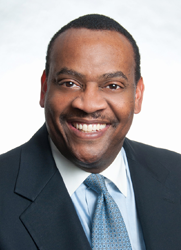You have /5 articles left.
Sign up for a free account or log in.

NCC Acting President Kenneth Saunders
ncc.edu
The search for a president at New York's Nassau Community College has been a struggle.
Since 2013, the institution with the largest single-campus enrollment campus in the state has seen a number of candidates, yet there's been little agreement among faculty, administrators and students on just who the next leader should be. The search has run into a couple of problems: faculty members say a breakdown in shared governance has contributed to the college's issues, and the State University of New York (SUNY) system in 2013 halted the search due to allegations of racial bias.
Two of the most recent presidential finalists -- one of whom is the college's acting president -- failed to garner the necessary number of votes from Nassau's Board of Trustees to proceed as the candidate. A candidate would need at least six affirmative votes from the 10-member board. So now campus administrators will renew their efforts to find a leader for the institution, which serves more than 23,000 students.
And they're now facing a deadline set by SUNY.
On Tuesday the SUNY Board of Trustees pushed Nassau to move forward on selecting a new president by setting a 60-day deadline for Saunders to remain acting president, or until an interim or permanent president is appointed, "whichever comes first." The resolution notes that an acting president typically serves one year.
Still, Arnold Drucker, a Nassau board trustee and co-chair of the 2014 search committee, said the college's most recent search has taken the typical amount of time and there is leadership in place.
The most recent search started in October. "For a normal timeline when you do search for a president and it's nationwide, it will take a few months," Drucker said. "Back in December, January, we conducted interviews and narrowed it down. The process hasn't taken any longer than expected."
Drucker said the search isn't starting over, since the college will keep its current search firm, Academic Search Inc., and there were few changes made in the search committee membership. He says the process is "ongoing."
Yet Nassau hasn't had a permanent president since 2012, when Donald P. Astrab resigned after receiving two no-confidence votes from faculty members. The current acting president, Kenneth Saunders, took his place and has served in that role for the last three years.
Saunders was one of the most recent finalists for the position. He spent 12 previous years as the college's vice president for academic student services.
The board hasn't barred Saunders's participation in the search, and Drucker said the acting president is welcome to keep his name in the applicant pool.
Saunders said he plans to do just that. Those who are against him are in the minority, he said.
"I'm clear that I'm committed to this institution and in my three years serving as acting president I've done, in my estimation and according to others, an exceptional job," he said.
Saunders said he's raised over $11 million in grants for the college's academic programs and more than $20 million for capital projects. He's also led the college into a partnership with the Nassau County police force for a new $50 million on-campus training facility.
"I have provided and managed a successful balanced budget for the last three years. My record speaks for itself," Saunders said.
But there are those who would like to see him excluded, like Nassau's Academic Senate, the college chapter of the American Association of University Professors and the Nassau Community College Federation of Teachers, which is affiliated with the American Federation of Teachers, a national union.
Evelyn Deluty, chairwoman of the Academic Senate, said having an interim president participate in the search can "cloud" the process. And she points to another reason why the search process hasn't been productive.
"There is a general breakdown of shared governance on this campus. We have a rich tradition where governance is carried out collaboratively with the president, administrators and Academic Senate," Deluty said. "That's how the college operated for 27 years under [former President Sean] Fanelli, and the last five years has been a slow, progressive whittling away of this process."
There are procedures, bylaws and guidelines that the SUNY system, of which Nassau is a part, and the college's regional accreditor, the Middle States Commission on Higher Education, have established for finding a president. The college's Board of Trustees hasn't followed those rules, Deluty said.
"Guidelines are being disregarded and similarly the governance procedures are being disregarded, so you have this general breakdown," she said.
She also points to recent academic resolutions made by the senate that were vetoed by the president. The board sustained the vetoes on two issues.
"In 27 years, with the last longest-serving permanent president running the college, if there was one veto that was the most," Deluty said.
Saunders agreed and said the faculty weren't challenged under Fanelli, but Astrab and he began to question the logic and reasoning behind some faculty initiatives. And for the first time, the administration is putting forward some of their own changes and projects, an example of true shared governance, he said.
Deluty, who was recently elected to the chairwoman of the senate position, will be one of the newest members of the search committee going forward.
She said the campus needs a leader who understands that Nassau is part of SUNY and has the diverse student body of a community college. Deluty points to the SUNY seamless transfer program as one initiative a new president would have to understand, particularly how it affects students.
The search for a new president has hit plenty of speed bumps since Astrab resigned in 2012. SUNY Chancellor Nancy Zimpher ordered a halt of the search so the board could investigate allegations of racial bias and unfairness. Board members felt those allegations were false, and the investigation appears to have been resolved. The latest search didn't resume until last fall.
Scott Stark, vice president of the college's Adjunct Faculty Association, said they have confidence in the search committee to do its job.
"Having a full-time president would be optimal, but the college has been moving along smoothly," Stark said.
However, he has concerns that they haven't been able to come to a decision and are now entering a third search.
"We're just all trying to do this as soon as possible because the best thing for the college is to have stability," Drucker said. "We're looking for a strong leader with a vision and the ambition to take this college and continue its very fine, exemplary tradition."







